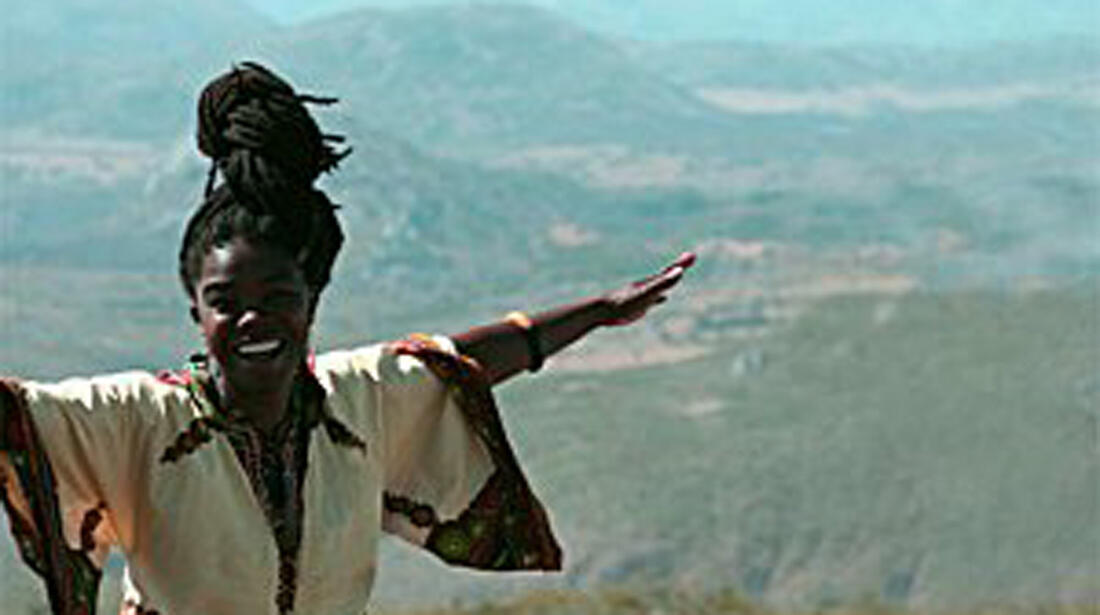Busi Ncube was born in Bulawayo, Matabeleland, Zimbabwe. Her father was a part-time musician who played the double bass with various groups in Bulawayo. He also brought home recordings of music that was very popular all around Africa at that time -from South Africa, Congo and Cuba. Busi`s favorite was Dorothy Masuka, who also came from Bulawayo and wrote songs for Miriam Makeba.
Busi got her first experience as a singer in church, singing African gospel music. This kind of music is still a huge influence on her singing, and on South African popular music, traditional mbira music from Zimbabwe, jazz rock and funk as well. Growing up, Busi was listening to Miriam Makeba, Dorothy Masuka, Dolly Rathebe and also American soul music and even disco! As a teenager she began performing with local groups in the clubs in Bulawayo. When she was 19, she got an offer through her sister – who also was a singer – to join Ilanga, a well-known group in Harare. After moving to Harare, Ilanga recorded three albums together and made a huge hit with a song written by Busi called “True love”. “True love” became one of the most popular songs in Zimbabwe and can still be heard on the radio in Zimbabwe today.
After Ilanga disbanded in the late 1980’s, she formed her own group, Band Rain, with some of the best musicians including guitarist Rodger Mbambo, percussionist Adam Chisvo and her twin sister Phathi. Band Rain has recorded 9 albums and has toured in southern Africa, the Czech Republic, Ireland, the UK and Norway. In Zimbabwe, they have performed regularly at “The Book Café”, the best and most important venue in Harare. They have also played major gigs at festivals, such as the Harare International Festival of Arts and the Chimani Music Festival. Busi took part in a project called “Life at Home/Hupenyu Kumusha” that featured her friend Chiwonisho Maraire, as well as Adam Chisvo, Rodger Mbambo and others. In addition to singing, her main instruments are Mbira, hosho and ngoma.
Mbira is an instrument that is central in Zimbabwe’s traditional music. It has always been important in village life, but was more or less forgotten during minority rule, because neither the missionaries nor the authorities wanted the people to express their own traditions. Thanks to a few individuals, among them Ephat Mujuru and the late Dumisani Maraire, the Mbira tradition was preserved for posterity. Mbira is now a significant part of Zimbabwean musical culture, through performers like Stella Chiweshe, Adam Chisvo, Chiwoniso Maraire and herself. In 2001 Busi was invited by The Norwegian Concert Institute to take part in a seminar about women in world music. There she met Norwegian/Algerian musician and producer, Malika Makouf Rasmussen, who invited her to join a project called “Women’s Voice”. This group consisted of female musicians from Tanzania, Zimbabwe, Algeria, France, Israel and Norway and released an album in 2004. They also toured in Scandinavia, Israel, Angola and Zimbabwe. They performed with Mari Boine when she received the Nordic Council’s Music Award 2003, and with the great Somalian singer, Maryam Mursal, at Oslo Mela in 2005. In 2004 they were nominated for the BBC 3 World Music Award. Busi is also featured on Mari Boine’s record “Idjagiedas” [“The Mermaid”] and she has performed with Norwegian artists such as Johan Sara Jr., Kristin Sevaldsen, Kossa Diomande, Banjo Mosele and even with a string quartet from the Oslo Philharmonic Orchestra. She is currently living in Norway, and has formed her own group featuring some of the top musicians from the Oslo music scene.


